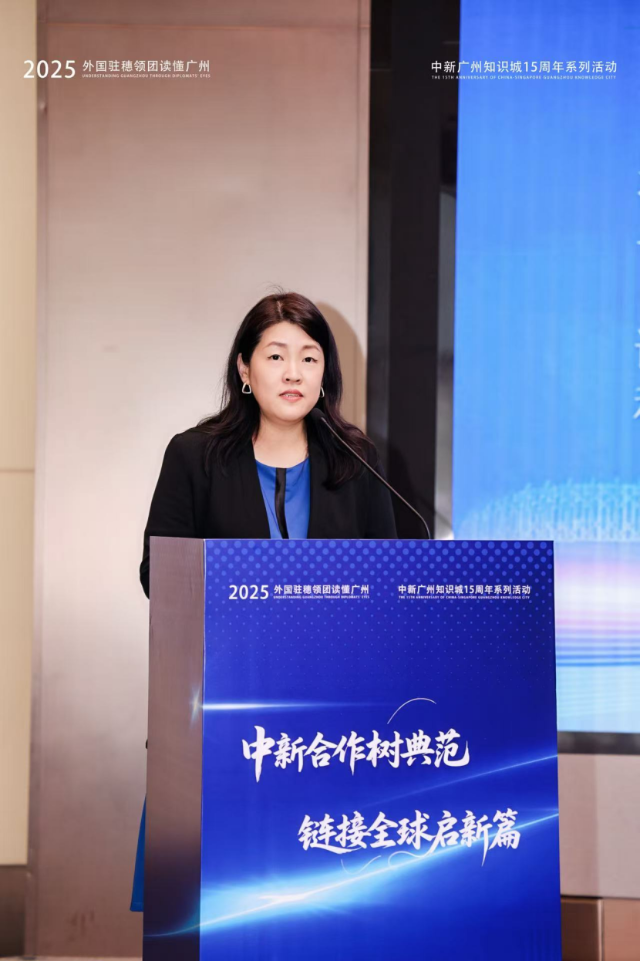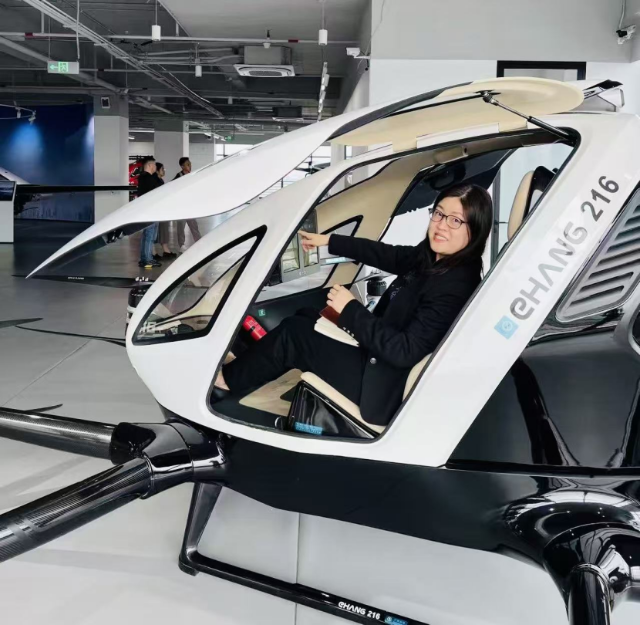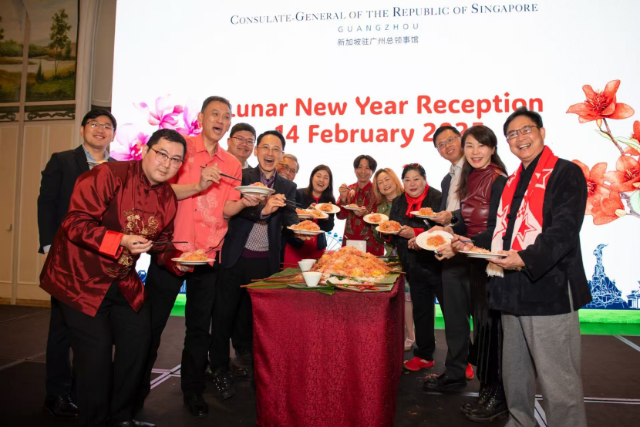"I would pick busy. I have to say I'm quite busy. Convenient. It is indeed Guangzhou or China that has developed to the current stage whereby life is actually quite convenient as long as you have some apps. The third one I would choose is probably inspiring. People in Guangdong have a very Gung Ho spirit."
Sitting on the sofa in the reception room of the Consulate General of Singapore in Guangzhou, Cindy Wee, Consul General of Singapore in Guangzhou, detailed to the South reporter three key words summarizing her time in Guangdong.
The uniqueness of China-Singapore Guangzhou Knowledge City
Since her position as Consul General of Singapore in Guangzhou in January this year, Cindy Wee lamented that time has just flown by as she arranged busy schedules visiting governments, firms, industrial parks, and schools in Guangdong over the ten months.
Setting the China-Singapore Guangzhou Knowledge City (CSGKC) based in Huangpu District as a prime example, she told the South reporter about the uniqueness of the state-level bilateral project.

Cindy Wee delivers a speech at the 15th anniversary of the establishment of the CSGKC in Guangzhou on April 10, 2025. (Photo: Foreign Affairs Office of Huangpu District)
In April this year, the Consulate General of Singapore in Guangzhou co-organized a visit to CSGKC for a delegation of foreign consuls general in Guangzhou, in collaboration with all levels of local governments in Guangdong Province. The visit aimed to celebrate the 15th anniversary of the establishment of the CSGKC.
As Cindy Wee observes, first of all, it enjoys the dynamic flexibility of the private sector, following market trends very closely while at the same time getting prompt support from the government.
In this respect, she appreciates the Guangdong provincial government, the Guangzhou government, as well as the Huangpu District government for looking into the demands and challenges that the knowledge city faces. They come together for very quick responses, feedback, and then tackle the issues.
The other aspect is about its robust IP ecosystem, as CSGKC started off by calling itself a knowledge city. It looks into the future of the Chinese economy as manufacturing advances to a certain stage. Chinese firms are also looking at how they could protect their own research, innovation, and development so that it can be a very sustainable business for them.
Along with IP production, it also has a strong ecosystem for research and innovation. Cindy Wee drew in enterprises. Two Singapore universities—the National University of Singapore and Nanyang Technological University—have set up their research translation center in the knowledge city.
"You have students, you have teachers, you have scientists. (They) go into the labs to do all the experiments, but they are not just experiments in words. Because they want to see how it translates into real market needs," she added.
All-round high-quality future-oriented partnership between China and Singapore
This year marks the 35th anniversary of diplomatic ties between Singapore and China. The two countries have elevated to an all-round high-quality future-oriented partnership in 2023.
As Cindy Wee underscores, these three elements capture what Singaporeans are looking for in terms of the bilateral relationship.
"All-around means a robust and emerging relationship," she noted. Singaporeans are always heeding the world trends along with the challenges and opportunities that the two countries can work together on.
She listed domains such as the digital economy, green economy, health care, aviation, and financing for collaboration and highlighted autonomous vehicles.
In late June, Singapore's Acting Minister for Transport, Jeffrey Siow, led a delegation and visited some autonomous vehicle makers such as PonyAI and WeRide in Guangzhou. Now PonyAI is going to pilot some tests with ComfortDelGro, a leading multi-modal transport operator based in Singapore.

Cindy Wee takes an autonomous aerial vehicle produced by Ehang in Guangzhou on Feb. 19, 2025.
"High-quality is not just about industries. We want to take them to a different level," Cindy Wee pointed out. It could be in the areas of intellectual property protection.
As for future-oriented, she stated that China and Singapore have common challenges, for example, an aging society and education.
"As Asians, we are always worried about our children's or our next generation's education. Are they meeting the challenges of the future? These are all areas that are very useful to us," Cindy Wee added.
From FTAs to food, collaboration links between Singapore and Guangdong
For trade between Singapore and Guangdong Province, Cindy Wee underlined the role of two pivotal free trade agreements (FTAs), namely, the Regional Comprehensive Economic Partnership (RCEP) and the Digital Economy Partnership Agreement (DEPA) as potential ones due to China's application to join in November 2021.
As one of the largest FTAs between all ASEAN countries as well as China, Japan, the Republic of Korea, Australia, and New Zealand, RCEP enhances economic integration as the pact removes tariffs and streamlines customs documentation and requirements.
Notably, Cindy Wee emphasized that given China is a member of the RCEP, it extends to all companies in the GBA to look at it and see how they can tap into the agreement.
As for the digital economy, authoritative data on the digital economy in Guangdong released in August this year unveiled that over half of its GDP growth was driven by it.
When Singapore looks at DEPA, the country seeks to start off with like-minded countries to see what they can work on together. "We welcome China's interest in acceding to DEPA. We look forward to hearing some good news," she added.

Cindy Wee enjoys Singaporean food with guests at Lunar New Year Reception in Guangzhou on Feb. 14, 2025.
Besides trade and investments, Singapore also expects what the future cooperation with Guangdong will be, as Cindy Wee observes.
"One commonality shared between Singapore and Guangdong is our love for food," she chuckled. Since her post as Consul General of Singapore in Guangzhou, local people have recommended that she go to Shunde and Chaoshan for food.
Similarly, she strongly encourages friends in Guangdong to come and visit hawker centers in Singapore. "There are a lot of food stalls. You can find Malay food, Indian food, and Chinese food, all coming together under one roof," she added.
Reporter: Zhang Ruijun
Video & Poster: Qin Shaolong
Script: Zhang Ruijun
Photo: Consulate General of Singapore in Guangzhou
Editor: Yuan Zixiang, Ou Xiaoming, James Campion, Shen He
















